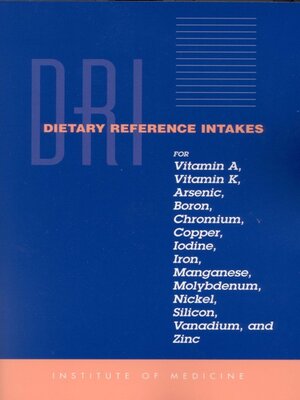Dietary Reference Intakes for Vitamin A, Vitamin K, Arsenic, Boron, Chromium, Copper, Iodine, Iron, Manganese, Molybdenum, Nickel, Silicon, Vanadium, and Zinc
ebook
By Institute of Medicine

Sign up to save your library
With an OverDrive account, you can save your favorite libraries for at-a-glance information about availability. Find out more about OverDrive accounts.
Find this title in Libby, the library reading app by OverDrive.



Search for a digital library with this title
Title found at these libraries:
| Library Name | Distance |
|---|---|
| Loading... |
This volume is the newest release in the authoritative series issued by the National Academy of Sciences on dietary reference intakes (DRIs). This series provides recommended intakes, such as Recommended Dietary Allowances (RDAs), for use in planning nutritionally adequate diets for individuals based on age and gender. In addition, a new reference intake, the Tolerable Upper Intake Level (UL), has also been established to assist an individual in knowing how much is "too much" of a nutrient.
Based on the Institute of Medicine's review of the scientific literature regarding dietary micronutrients, recommendations have been formulated regarding vitamins A and K, iron, iodine, chromium, copper, manganese, molybdenum, zinc, and other potentially beneficial trace elements such as boron to determine the roles, if any, they play in health. The book also:
This book will be important to professionals in nutrition research and education.







